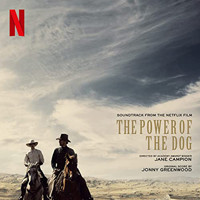- Composed by Jonny Greenwood
We have seen it before, of course – the two asteroid movies, Deep Impact and Armageddon; the two anthropomorphic small insect movies, A Bug’s Life and Antz – and now 2021 sees two movies about canine hijinks released shortly after one another, with The Power of the Dog following a few days after Clifford the Big Red Dog. Whether it was really a coincidence or not I suppose we will never know, but while it may have been slightly beaten in terms of release date, it is Jane Campion’s film that looks set to dominate when it comes to awards season. Her first full-length film in twelve years, it’s a searing drama about masculinity, beautifully acted by Benedict Cumberbatch, Kirsten Dunst, Jesse Plemons and Kodi Smit-McPhee whose star-making turn as a young man in 1920s Montana and his complex relationship with his mother’s brother-in-law is a real highlight.
Interestingly, Campion has never worked with the same composer twice on movies; she did entice one of the all-time-great romantic film scores out of Wojciech Kilar on The Portrait of a Lady and plenty more fine music out of others. This time it is the turn of Jonny Greenwood, who from the day he first stepped onto a scoring stage for a movie has defied expectations of rock stars-turned-film composers, with intelligent and frequently very challenging music seeking out intellectual corners within films. While he doesn’t reuse any of John Debney’s thematic material from Clifford, The Power of the Dog is likely his most-accessible film score yet, while losing none of the usual power of Greenwood’s music within the context of the film itself, where it simply shines and will surely be a major contender when the end-of-year awards lists are drawn up.

Having said it is his most-accessible score yet, that is all relative of course – don’t go into this expecting The Magnificent Seven. It is essentially played as a psychological portrait of the inside of Cumberbatch and Smit-McPhee’s characters’ minds. The opening “25 Years” features a fascinating sound of plucked cello – played, Greenwood said in an interview, like a banjo – against bowed strings – it’s recognisably a “western” sound, but the very opposite of the wide-open-spaces often associated with the genre. Then comes “Requiem for Phil”, opening with a mournful horn solo and featuring some really interesting writing as complex string harmonies dance around through the piece: the strength of feeling the composer manages to get from a relatively small ensemble is hugely impressive.
“So Soft” sees Greenwood introduce the more pastoral sound he occasionally uses – a slightly warmer feel on the surface is contrasted by individual strings going off in unexpected directions, leading to a slightly disjointed, unsettling feeling even for the moments of apparent harmony. It’s clever: the film has multiple layers and here Greenwood seems to be exploring those layers individually at the same time, in something of a dramatic masterclass. Then comes “Detuned Mechanical Piano”, which does exactly what it says it will, featuring some exceptional playing.
The score’s warmest feature is the theme first heard in “West Alone”, a truly beautiful duet between piano and cello which expresses emotion outwardly, not inwardly as the bulk of the score does. It is reprised later on in “West” and even if the rest of the score makes demands of the listener, this particular theme is an unusual crowd-pleaser. “Viola Quartet” (another literal cue title!) is a remarkable piece – a portrait of emotional turmoil, really, something Alex North would have been proud of (and those are not words I use lightly). But the greatest turmoil of all is perhaps in “Paper Flowers” – the detuned piano returns, this time musically symbolising some sort of descent into madness – it’s quite brilliant.
It is clearly not going to be an album of music for everybody, but even if you have found difficulties appreciating Jonny Greenwood’s previous scores on album, this may just be one that will appeal. Personally I think it’s the best film score of 2021 by some distance, and the album follows suit. A word about the album, by the way – with cues presented radically out of sequence in terms of their appearance in the film, and with some missing – it’s been produced the old-fashioned way, with the optimal listening experience in mind – and is all the stronger for it. Don’t go in expecting a score for a classic western – go in expecting a Jonny Greenwood score – it is an enriching, rewarding experience from one of the most interesting and experimental film composers of our era.
Rating: *****
facebook.com/moviewave | twitter.com/MovieWaveDotNet | amazon.com












Great review. The blend of dry humour and commentary is classic Moviewave. Looking forward to hearing this soundtrack. Campion has often got the very best out of her composers.
Greenwood is a dead ringer for Cillian Murphy!
While this may be good music, well-conceived and composed, I found it seriously overwrought in the film. It put me so on edge from the very start of the movie that I was expecting some horrific violence to occur at any moment. As a result, there was no dramatic arc or ebb and flow.
Moreover, did the music reflect the major turning point in the relationship between the two characters? Some kind of shift should have occurred, but I didn’t notice one.
For once, we get a score that plays a prominent role in a modern movie, but I felt it sometimes hindered the drama rather than helped.
I can’t help it, however hard I try to like a score by Greenwood, I never succeed! His musical style is simply not for me, I guess. While watching this movie I kept asking myself why is all the fuss about this music? For me it didn’t really add much to the film.